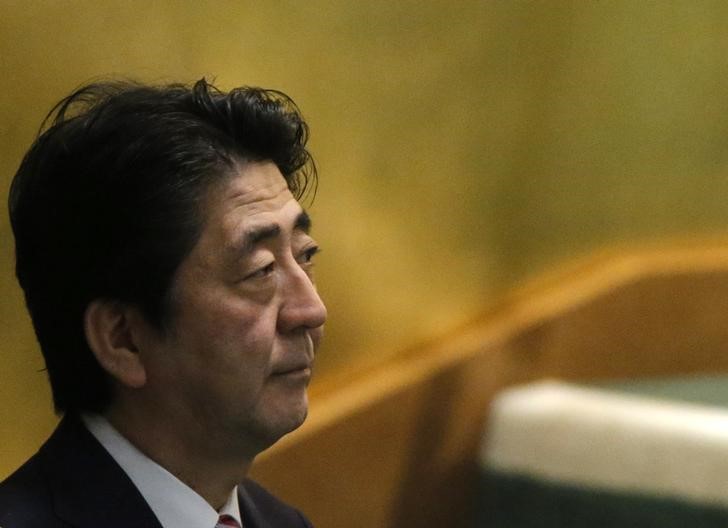(Bloomberg) -- Japan’s coronavirus emergency could end as soon as Monday, but Prime Minister Shinzo Abe’s political troubles may be just beginning.
Abe’s efforts to curb the outbreak and ease its economic damage have been widely ridiculed as slow and ineffective. He’s been outshone by regional governors, who pressed him to finally call the state of emergency credited with halting the spread of infections for now. Now, a favoritism scandal has helped push his approval rating to a level that has forced past premiers to resign.
Moreover, the crisis has undermined support for his economic stewardship and depleted the resources Abe will need to avert a deep recession and pull off another comeback like ones that made him the country’s longest-serving premier. As a result, some in the ruling Liberal Democratic Party are weighing possible successors, led by former Foreign Minister Fumio Kishida.
“The more unease grows over the economy, the less people support him,” said Lully Miura, president of Tokyo-based political consulting firm Yamaneko Research Institute. “People who haven’t received financial aid are losing their jobs and companies are going under.”
Abe’s difficulties provide a warning to other world leaders who like him weathered the initial pandemic shock only to be confronted with a historic economic slowdown. Analysts expect Japan to suffer a contraction of almost 22% this quarter, the deepest since records began in 1955.
While Japan has suffered far fewer coronavirus infections and deaths than any of its Group of Seven peers and Abe could soon lift the state of emergency for Tokyo, his handling of the outbreak has reinforced concerns that his government has grown complacent after seven years in power. Abe has been criticized for delaying an emergency declaration when local cases began to surge and for being slow to close Japan’s borders to Chinese visitors.
Meanwhile, botched efforts to distribute cash handouts and re-usable masks became fodder for talk show ridicule. An Instagram video of Abe relaxing on a sofa meant to encourage people to stay home instead got slammed for appearing tone deaf.
Apart from the pandemic, Abe has been forced to change plans after another in a long string of controversies over government actions that appear to benefit political allies. Last week, Abe shelved a retirement bill that opposition lawmakers said would’ve allowed his favored candidate to stay on to become the country’s top prosecutor.
Making matters worse, the potential candidate, Hiromu Kurokawa, is now set to resign. Justice Minister Masako Mori said Thursday that Kurokawa had play mahjong games for money, despite emergency virus orders discouraging such social activities.
Support for Abe’s cabinet plunged 13 percentage points in less than four weeks to 27%, according to a poll released by the Mainichi newspaper Saturday, with any level below 30% traditionally seen as a danger zone for the government. Disapproval surged 19 percentage points to 64%, a trend mirrored by other surveys.
“When support falls, his sway over the party weakens,” Miura said. In another sign of Abe’s weakening position, his junior coalition partner forced him to change direction on the size and scope of cash handouts for individuals.
Abe has bounced back from several crises since taking office for the second time in 2012 and gone on to win six national elections, benefiting from a weak and splintered opposition. The coronavirus, however, comes at a time when many in the LDP had already begun to think about who will succeed him after his third -- and ostensibly final -- term as party leader expires in September 2021.
Who’s Next?
Kishida, the former foreign minister and current LDP policy chief, is widely seen as most likely to get the job, Miura said. Other potential candidates include Health Minister Katsunobu Kato and Economy Minister Yasutoshi Nishimura, who have both bolstered their profiles by playing key roles in Japan’s pandemic response.
Polls generally show Shigeru Ishiba, a former defense minister who has distanced himself from the government, as the public’s favorite.
Abe no longer has the fiscal ammunition he enjoyed when the economy was steady and the country had virtually full employment. Japan’s troubles are likely to deepen as households limit spending to essentials and companies cut back on investment, production and hiring to stay afloat.
Still, it might be too early to rule out Abe from staging another comeback and even securing a fourth term as LDP leader.
“Support will definitely fall for a week or two, but after that what happens to his support rate will depend on the spread of the virus,” said Harukata Takenaka, a political science professor at the National Graduate Institute for Policy Studies. “If the situation settles down, people may see him as having done a good job.”
©2020 Bloomberg L.P.
